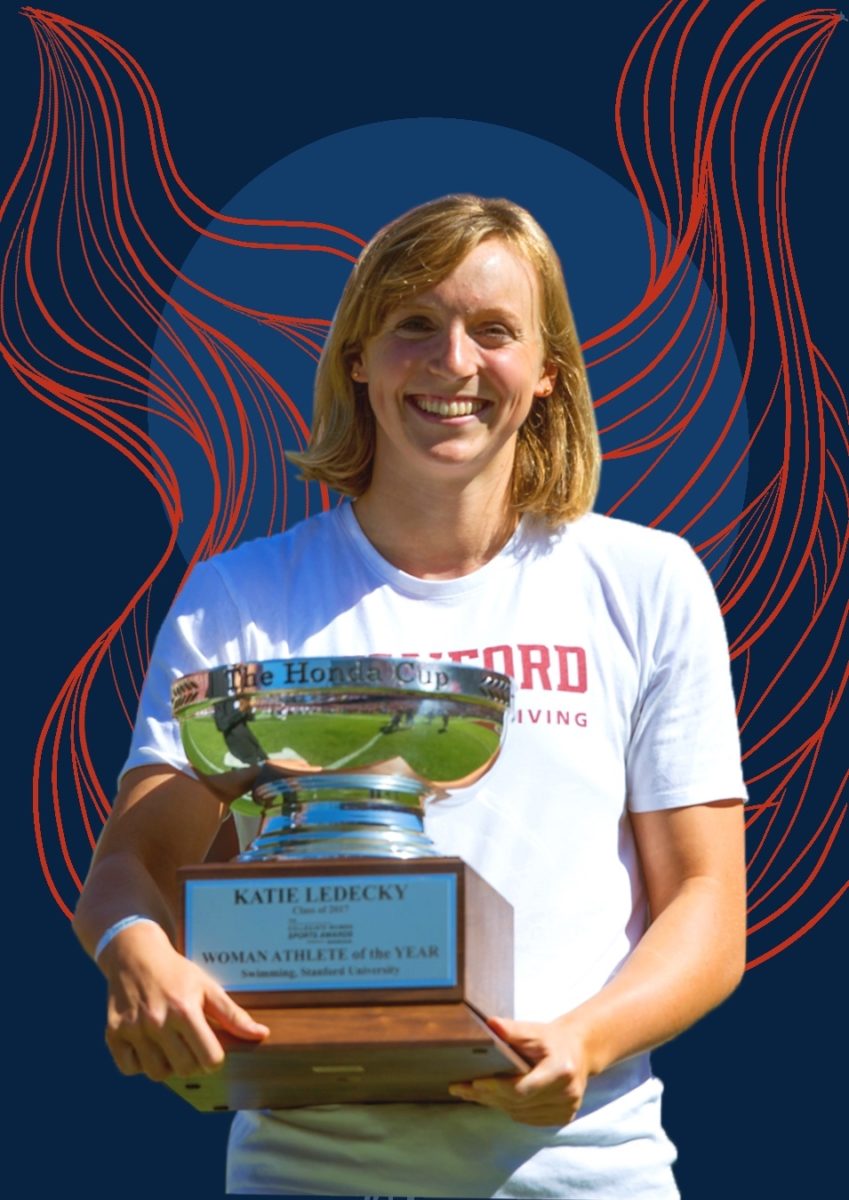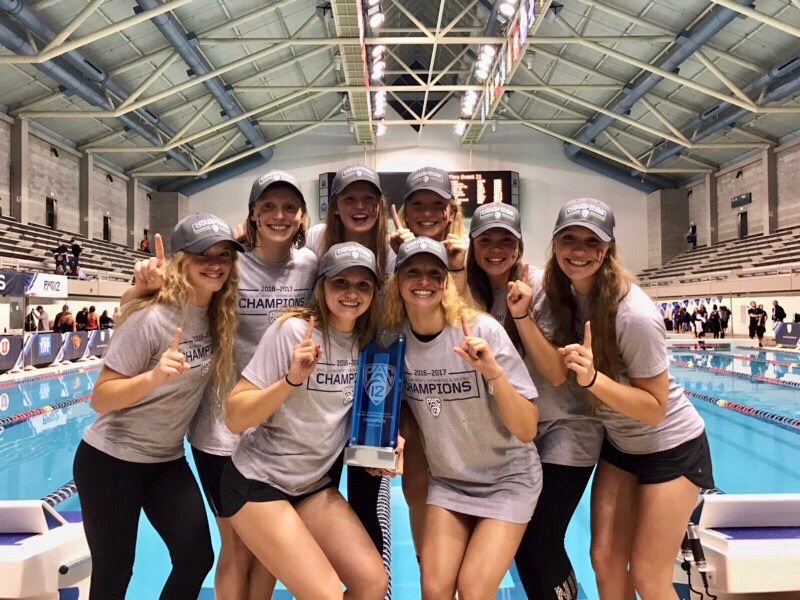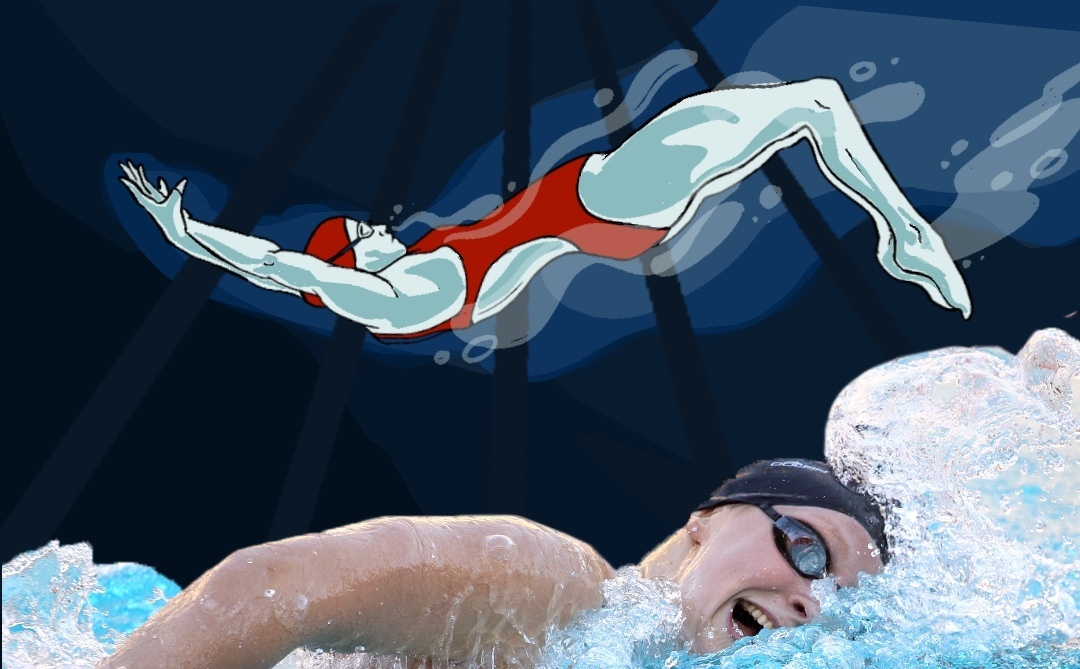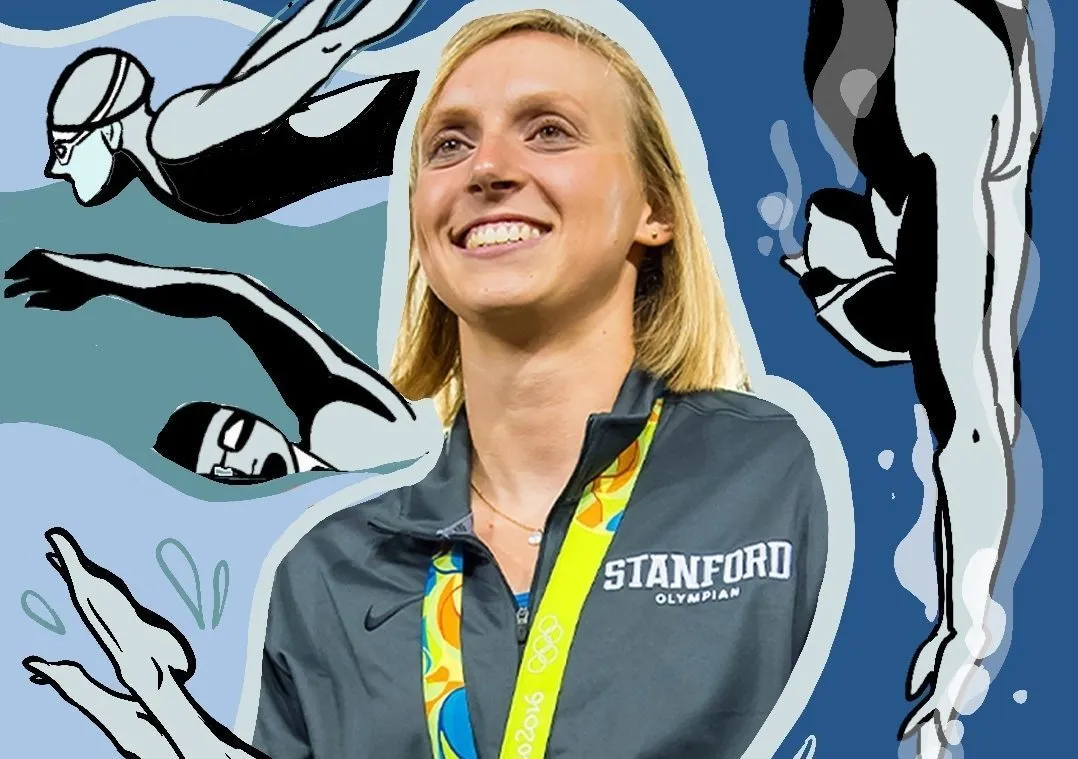Five days after she turned 23, Katie Ledecky ’20 was planning to head to Colorado Springs to train in the U.S. Olympic and Paralympic Training Center. This was the plan: Train in Colorado for three weeks. Compete in Mission Viejo. Back to Stanford. Compete in Indianapolis. Back to Stanford (again). Trials at Omaha. And if all went well, some more training up until the Tokyo Olympics.
But her tightly scheduled road to Tokyo crumbled with the cascade of stay-at-home orders. On March 17, Colorado’s public health order made training in the U.S. Olympic and Paralympic Training Center no longer a viable option. Her competitions, like most sporting events, were canceled. By the end of the month of March, the final destination, the Tokyo Olympics, too, was also postponed for another year. The opening ceremony is currently rescheduled for July 23, 2021.
“There were just so many unknowns,” said Ledecky during a virtual interview regarding her scramble to find new training plans.
For now, Ledecky stays put in her apartment, about a 10-minute drive from campus, where she’s been living for the past year since taking an academic leave of absence last spring to focus on training for the Tokyo Olympics. Now that Ledecky has an additional year until the next Olympics, she is making the most out of the time she would have typically spent in the water. Like any other Stanford student, she is taking her psychology and biology classes on Zoom and submitting p-sets online. Outside of classes, the swimmer stays at home — calling family members, playing online games on family-zoom-nights and cooking.
“I’m keeping my mind busy, which I think has been helpful,” Ledecky said.
This summer’s intended competition would have marked Ledecky’s third chance to compete at the Olympics. By now, much of the world knows that Ledecky is fast. After winning five Olympic gold medals and 15 world championship gold medals — the most any woman has achieved in the history of swimming — Ledecky has become a household name.
At the 2012 London games, Ledecky, only 15 years old and the youngest Team USA delegate that year, won her first Olympic gold medal in the 800 meter freestyle. In this race, frequently dubbed as one of the biggest upsets of the London games, teenage Ledecky beat British Olympic gold-medalist Rebecca Adlington, who had won the event at the 2008 Beijing Olympics. Little did the world know that this marked only the beginning for Ledecky: In 2016 she surprised global viewers by claiming four gold medals and a silver at the Rio Olympics.
The teenage swimming phenom boggled minds of viewers — one headline asked: “What was Katie Ledecky’s secret?”
Contrasting her extraordinary performance and the celebrity spotlight that followed, however, Ledecky’s “secret” was rather quite straightforward: simple hard work.
“What I’ve done over the past couple years has been pretty great, but even that doesn’t define my swimming,” she said in an ESPNW interview in 2016. “Working hard and doing everything I can to be successful should be my identity.”
To say that what she had achieved during that time was “pretty great” was an understatement owing to Ledecky’s humility. Following the 2016 Olympics, she revealed that one of her goals for Rio had been to swim 8:05 or better in the 800-meter freestyle. Since her American record of 8:14.63 set at her gold-medal 800 free race in the 2012 London Olympics, Ledecky had seen steady improvement, culminating with a stunning time of 8:04.79 in Rio — a world record that still stands.
Naturally, following her sensational performance in Rio, the question became: “Where does Katie Ledecky go from here?”
“After Rio, it probably took me a little bit longer to come up with those goals for [the four years leading to] 2020 than it did in the past,” Ledecky said.
Looking ahead to Tokyo, she intentionally readjusted her mindset to focus on what she describes as “realistically challenging goals.” It was no longer a game of getting a little better by the year — there would be more ups and downs. After all, Ledecky had reached a caliber of performance where it’s harder and harder to get better. From London to Rio Ledecky shaved roughly 10 seconds from her own record in the 800m free — it would have been unreasonable to expect a breakthrough of the same magnitude. Ledecky knew that she would have to take a different approach than her record-on-record years leading up to Rio.
“Sure the time might not be faster in 2017 or 2018, or 2019. But that doesn’t necessarily mean that I’m not getting better,” Ledecky said.
It makes sense that Ledecky has taken time to reframe her goals: Ledecky will rarely promise anything she can’t do — she doesn’t share her goals with the public, well at least until she’s met them in world-record fashion.
“[She’s] really disciplined and diligent about how she goes about [training],” said her coach Greg Meehan, head coach of Stanford women’s swimming and 2020 U.S. Olympic women’s swimming.
According to Meehan, one of swimming’s main challenges is that athletes don’t “compete in peak performance mode” very often. After all, swimming’s largest stage at the Olympics comes only every four years.
While the image of Ledecky atop a podium is easily recognized, she spends more time training than competing.
“She embraces the really hard part about our sport — that day-to-day grind,” Meehan added.
“Everyone sees her success in the pool,” said swimmer Katie Drabot ’20, who joined Stanford’s team the same year as Ledecky. “But if you were to see her in practice day-to-day you would understand why she’s the star she is. She takes every opportunity she can get to make herself better and make those around her better.”

While the swimmer may identify with hard work over accolades, Ledecky’s past four years have been nothing short of impressive; she finished her two years as a collegiate swimmer with six Stanford, 11 American and 15 NCAA records, becoming the second freshman since three-time Olympic gold medalist swimmer Tracy Caulkins to win the Honda Cup, an award given to the country’s top female collegian. In Ledecky’s freshman year, the Cardinal won their first NCAA championship since 1998.
Ledecky turned professional following her sophomore season. In her debut in May 2018, she broke her own world record in the 1500m freestyle with a historic 15:20.48, which remains one of three world records she holds.
Even so, the past four years didn’t paint a consistently upward streak. Last year at the 2019 FINA World Championships in South Korea, the largest international swimming event preceding the Olympics, Ledecky was favored to take home a number of golds. But Ledecky got sick and had to pull out of two events. Although she ultimately succeeded in returning to the pool to take home a gold in the 800-meter freestyle, the championship was not her best performance. But Ledecky seemed relatively unfazed by this setback.
“In the moment, yeah, I was incredibly disappointed,” Ledecky said. She wasn’t talking about her times or lack of medals — she was describing how she lost two chances to swim. For Ledecky, the work always comes above everything else.
“I kept reminding myself that even though I didn’t get to show what I was capable of, [all] the hard work before that didn’t go away — I still had that in me,” she said.
Although Ledecky has centered her past four years on “realistically challenging” goals, she is still ambitious. With the 1500-meter freestyle added as a new event at the Tokyo Olympics, it might be a chance for the first “Ledecky Slam”, where the swimmer takes home the gold in 200-, 400-, 800- and 1500-meter freestyle races — something she pulled off at the 2014 Pan Pacific Championships and 2015 World Championships.
“It’s an event that I like, and it’s a challenge, obviously. And it’s fun that it’s something that I can really focus on in the Olympics,” Ledecky said.
Originally, the 200 and 1500 were scheduled to take place in the same session, for both prelims and finals.
“So that adds 3000 meters of swimming to my program, which is a lot!” Ledecky said with a laugh. (This was the most overt excitement Ledecky showed in the entire interview, contrasting her consistently calm, grounded attitude.)

Over the past four years while working toward Tokyo, Ledecky has found a home at Stanford. Ledecky began her Stanford experience in the fall of 2016, carrying the Olympic spotlight from the Rio games. Speculations from the press and sports agents suggested that the star would be missing out on anything from $5 million to $8 million by attending college, but Ledecky kept the verbal commitment she made to Stanford as a high school junior in 2014 and proceeded to enroll.
“I’m only 19, and I don’t feel like I need to represent something bigger than my teammates, coaches, friends and family,” she said to the Boston Globe in 2016. “Down the road I want to be a professional swimmer, but first I want to get an education.”
Although the most decorated female athlete of the Rio Olympics arrived on the Farm in Olympic stardom, the 19-year-old began an ordinary journey as a college freshman.
She had three roommates in Roble, a four-class dorm where freshmen usually live in suite-room style quads.
“[On the first day, Ledecky] came up and said, ‘Hey, Karly, I think we’re roommates.’” recalled Karly Chin ’20. A senior from Northern California, Chin was one of Ledecky’s freshman roommates.
Like most athletes, Ledecky had moved in early to train with the swim team. At Stanford, freshman roommate pairings are arranged by the school, and students do not know who they will live with until move-in day.
“I guess I was surprised just because she was a public figure that I had heard about in the news before … It’s kind of just a funny thing to have that public figure become a personal friend.” Chin added. “[But] after that, it was just kind of any other normal feeling of getting to know your first college roommate.”
The quad ate together, did homework together, sat on the floor to do watercolor painting together and other ordinary activities that mark the beginning of a friendship. Since freshman year, the group has still tried to get together for dinner or brunch at least once every quarter.
“[She’s] just probably one of the most genuinely nice people I’ve ever met,” Chin said. “I absolutely loved that quad. We still talk about how we lucked out.”
“I wasn’t sure how [transitioning to Stanford] was gonna go, but right when I moved in, I felt really welcomed.” Ledecky said. “We felt like we had a dream quad.”
In addition to her friendships with her freshman-year roommates, Ledecky found a home alongside her teammates on the swim team. As her brother Michael wrote in a 2016 open letter to her in his college newspaper, finding “friends who care” among the “25 sisters” on the team didn’t end up being a problem.
“We all have really similar personalities [and] work ethic … values … I don’t know how to describe it,” Ledecky said fondly when describing what the Stanford team meant to her.
It was clear it meant something special — Ledecky has an ability to answer any question with calm poise; it was rare that she was out of words. Although she only competed for the Cardinal for two years, she used Stanford’s facilities and trained with the team before the wake of pandemic.
“She really just brings a great energy to the team,” said fellow swimmer Brooke Stenstrom Winaker ’20. “She’s always been really supportive of everyone.”
Stenstrom Winaker also lived in Roble with Ledecky during her freshman year, and the two would bike together to the pool every morning with a few other teammates. This past winter, Ledecky stood as a bridesmaid at Stenstrom Winaker’s wedding.
“She really wants the best for her team and I think that’s what makes her such a great swimmer and such a great individual,” Drabot said.
“I know [those friendships] will last a really, really long time,” Ledecky said.

For the past two years, Ledecky has swum professionally. Now that swimming has become, in a sense, Ledecky’s job — does she still enjoy it?
“Yeah, I do. I wouldn’t be doing it if I didn’t,” Ledecky replied without pause. “It’s silly and kind of mind blowing to people when I say that it’s just like an extracurricular activity, almost.”
Despite the spotlight, going into Rio Ledecky had said that not much pressure had been added to her everyday life, thanks to her family’s strong support system. That remains constant today.
“I’m lucky to have a family that loves me whether I swim really well or swim poorly, or don’t swim at all,” she said. “They’re not going to change how they treat me because of what I’m doing in swimming.”
Ledecky also feels supported as part of Stanford’s team, though she doesn’t compete for the Cardinal.
“[In swimming] it’s not like you get drafted to a team and you have to completely get up and move to wherever that team is located,” Drabot said. “You just kind of stay with your team, and you’re just more so labeled as a professional swimmer. We still treat her like she’s a part of the team.”
Ledecky’s public platform has undoubtedly gotten larger over the past few years. Following the Rio Olympics, Ledecky has grown from a teenage sports sensation to a public figure who carries an impact. In 2016, Ledecky was named as one of TIME Magazine‘s 100 Most Influential People. Last year, she was named as one of AP’s female athletes of the decade; she was also female athlete of the year in 2017.
“It’s been fun to see her embrace her role in the sport … As a role model to so many young girls, especially,” Meehan said. “It’s something that I’ve really appreciated and admired as I’ve watched her move through these last couple of years.”
Ledecky is aware of her platform and is deliberate in using it for the right reasons.
“I take great responsibility to use it in the right ways, with the right people, and for the right people,” Ledecky said.
Recently, she has utilized her platform to encourage younger swimmers, athletes and fans to follow safety guidelines and stay positive in the thick of COVID-19. In an appearance on CNN’s coronavirus town hall following guests Anthony Fauci and Bill Gates, Ledecky joined Anderson Cooper and Sanjay Gupta to say that the Olympics postponement was “certainly the right call.” She’s also been using social media to encourage followers to stay home, maintain good health and keep communities safe.
“I think it was important to [talk] about [the Olympics postponement] so that other people are encouraged to stay positive.” Ledecky said. “As athletes, we sometimes get very caught up in our competitions, and it’s so central to our lives … It’s something like this that [reminds] all the athletes that there are a lot bigger things out there, and we’re just kind of one part of this much larger world.”
As Ledecky continues to speak at virtual panels and interviews, she is also trying her best to stay informed.
“I’m a big Dr. Fauci fan,” Ledecky said. “I think it’s important to listen to [the experts] first and foremost. You get the most straight info and facts from them.”
Despite Ledecky’s impressive career as an athlete, the swimmer — like many of her undergraduate peers — is still figuring out what specifically she wants to do in the future. During her first two years of college, she took whatever sounded interesting. Her sophomore year, she was named the Google Cloud Division 1 Academic All-America Team – an honor given to the top student-athletes. Ledecky had a GPA of 3.99.
After taking psychology classes, she decided that would be the academic path for her. She also got involved with research at the Mind and Body Lab, led by her advisor Alia Crum, an assistant professor of psychology.
As for a post-swimming career, she’s considering anything from law or business school to working in education. One constant in future ambitions, during and after her swimming career, is that she wants to do something to help others — a trait which she says has been “constant” since she was much younger.
As for the rest? “Figuring things out is a goal, right?” Ledecky said with a smile.

With the extra year before the Olympics actually kick off, Ledecky and her fellow athletes are adjusting.
In an attempt to train given the constraints of the pandemic, she’s ordered bands and weights for in-room dryland training and swims in a backyard pool when the opportunity arises.
“It’s probably been a little less about training and a little bit more about swimming and keeping feel with the water,” said Meehan.
“I don’t know if it’s fully hit me yet,” Ledecky said of the postponement. “Once we get closer to June and July when the Olympic trials and the Olympics were supposed to be, I think it’ll hit me more — just missing being ready for that joy and fun and camaraderie that you have with your teammates … At the same time, I don’t think it’s a good thing to think about that too much.”
Ledecky says the upcoming Olympics doesn’t feel “all that different” from the last two. But without doubt, Ledecky will arrive in Tokyo with more maturity. Since Rio, Ledecky has declared a major, set a new world record, gone professional, entered her 20s, moved into her own place and is now adjusting to life in a pandemic.
“These four years have felt a lot longer than four years,” Ledecky said.
While the uncertainty of today brings more uncharted territory for the Olympian, Ledecky knows that uncertainty is part of the long haul.
“I’ve certainly had races where I’ve had to adjust race plans — we all have to be really flexible and able to adjust on the fly,” Ledecky said. “We have to be coachable during this time; we have to listen to what we’re being told and follow those plans.”
When the time comes, Ledecky will dive into the pool and race toward her goals. But out of the water, life is not a race for Ledecky. Whether it was her decision to relish the college experience instead of immediately turning professional, the patience she has given to her goals since Rio or the deliberate care she puts into her platform — Ledecky isn’t afraid to take her time.
Contact Inyoung Choi at ichoi ‘at’ stanford.edu.
